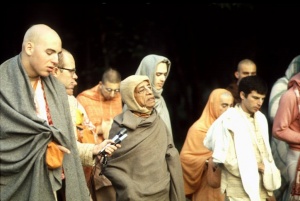SB 10.86.20: Difference between revisions
m (1 revision(s)) |
(Vanibot #0018 edit: make synonym terms in Sanskrit italic in SB - Vanisource) |
||
| Line 1: | Line 1: | ||
{{info | {{info | ||
|speaker= | |speaker=Śukadeva Gosvāmī | ||
|listener=King | |listener=King Parīkṣit | ||
}} | }} | ||
[[Category:Srimad-Bhagavatam - Canto 10 Chapter 86]] | |||
[[Category:Bhagavatam Verses Spoken by Sukadeva Gosvami - Vanisource|108620]] | |||
<div style="float:left">'''[[Srimad-Bhagavatam]] - [[SB 10|Tenth Canto]] - [[SB 10.86: Arjuna Kidnaps Subhadra, and Krsna Blesses His Devotees|Chapter 86: Arjuna Kidnaps Subhadrā, and Kṛṣṇa Blesses His Devotees]]'''</div> | |||
<div style="float:right">[[File:Go-previous.png|link=SB 10.86.19]] '''[[SB 10.86.19]] - [[SB 10.86.21]]''' [[File:Go-next.png|link=SB 10.86.21]]</div> | |||
{{RandomImage}} | |||
{{SBnotice}} | |||
==== TEXT 20 ==== | ==== TEXT 20 ==== | ||
<div | <div class="verse"> | ||
ānarta-dhanva-kuru-jāṅgala-kaṅka-matsya- | :ānarta-dhanva-kuru-jāṅgala-kaṅka-matsya- | ||
pāñcāla-kunti-madhu-kekaya-kośalārṇāḥ | :pāñcāla-kunti-madhu-kekaya-kośalārṇāḥ | ||
anye ca tan-mukha-sarojam udāra-hāsa- | :anye ca tan-mukha-sarojam udāra-hāsa- | ||
snigdhekṣaṇaṁ nṛpa papur dṛśibhir nr-nāryaḥ | :snigdhekṣaṇaṁ nṛpa papur dṛśibhir nr-nāryaḥ | ||
</div> | </div> | ||
| Line 17: | Line 22: | ||
==== SYNONYMS ==== | ==== SYNONYMS ==== | ||
<div | <div class="synonyms"> | ||
''ānarta''—the people of Ānarta (the region in which Dvārakā is situated); ''dhanva''—the desert (of Gujarat and Rajasthan); ''kuru-jāṅgala''—the region of the Kuru forests (the districts of Thaneswar and Kurukṣetra); ''kaṅka''—Kaṅka; ''matsya''—Matsya (the kingdoms of Jaipur and Aloyar); ''pāñcāla''—the districts surrounding both banks of the Ganges; ''kunti''—Mālava; ''madhu''—Mathurā; ''kekaya''—in northeast Punjab, the region between the Śatadru and Vipāśā rivers; ''kośala''—the ancient kingdom of Lord Rāmacandra, stretching from the northern border of Kāśī to the Himalayas; ''arṇāḥ''—and the kingdom bordering Mithilā on the east; ''anye''—others; ''ca''—also; ''tat''—His; ''mukha''—face; ''sarojam''—lotus; ''udāra''—generous; ''hāsa''—with its smiles; ''snigdha''—and affectionate; ''īkṣaṇam''—glances; ''nṛpa''—O King; ''papuḥ''—drank; ''dṛśibhiḥ''—with their eyes; ''nṛ-nāryaḥ''—the men and women. | |||
</div> | </div> | ||
{{SBcollapse}} | |||
==== TRANSLATION ==== | ==== TRANSLATION ==== | ||
<div | <div class="translation"> | ||
The men and women of Ānarta, Dhanva, Kuru-jāṅgala, Kaṅka, Matsya, Pañcāla, Kunti, Madhu, Kekaya, Kośala, Arṇa and many other kingdoms drank with their eyes the nectarean beauty of Lord Kṛṣṇa's lotuslike face, which was graced with generous smiles and affectionate glances. | The men and women of Ānarta, Dhanva, Kuru-jāṅgala, Kaṅka, Matsya, Pañcāla, Kunti, Madhu, Kekaya, Kośala, Arṇa and many other kingdoms drank with their eyes the nectarean beauty of Lord Kṛṣṇa's lotuslike face, which was graced with generous smiles and affectionate glances. | ||
</div> | </div> | ||
__NOTOC__ | </div> | ||
</div> | |||
<div style="float:right">[[File:Go-previous.png|link=SB 10.86.19]] '''[[SB 10.86.19]] - [[SB 10.86.21]]''' [[File:Go-next.png|link=SB 10.86.21]]</div> | |||
__NOTOC__ | |||
__NOEDITSECTION__ | |||
Revision as of 20:11, 1 December 2017

A.C. Bhaktivedanta Swami Prabhupada
Please note: The synonyms, translation and purport of this verse were composed by disciples of Śrīla Prabhupāda
TEXT 20
- ānarta-dhanva-kuru-jāṅgala-kaṅka-matsya-
- pāñcāla-kunti-madhu-kekaya-kośalārṇāḥ
- anye ca tan-mukha-sarojam udāra-hāsa-
- snigdhekṣaṇaṁ nṛpa papur dṛśibhir nr-nāryaḥ
SYNONYMS
ānarta—the people of Ānarta (the region in which Dvārakā is situated); dhanva—the desert (of Gujarat and Rajasthan); kuru-jāṅgala—the region of the Kuru forests (the districts of Thaneswar and Kurukṣetra); kaṅka—Kaṅka; matsya—Matsya (the kingdoms of Jaipur and Aloyar); pāñcāla—the districts surrounding both banks of the Ganges; kunti—Mālava; madhu—Mathurā; kekaya—in northeast Punjab, the region between the Śatadru and Vipāśā rivers; kośala—the ancient kingdom of Lord Rāmacandra, stretching from the northern border of Kāśī to the Himalayas; arṇāḥ—and the kingdom bordering Mithilā on the east; anye—others; ca—also; tat—His; mukha—face; sarojam—lotus; udāra—generous; hāsa—with its smiles; snigdha—and affectionate; īkṣaṇam—glances; nṛpa—O King; papuḥ—drank; dṛśibhiḥ—with their eyes; nṛ-nāryaḥ—the men and women.
Translation and purport composed by disciples of Śrīla Prabhupāda
TRANSLATION
The men and women of Ānarta, Dhanva, Kuru-jāṅgala, Kaṅka, Matsya, Pañcāla, Kunti, Madhu, Kekaya, Kośala, Arṇa and many other kingdoms drank with their eyes the nectarean beauty of Lord Kṛṣṇa's lotuslike face, which was graced with generous smiles and affectionate glances.